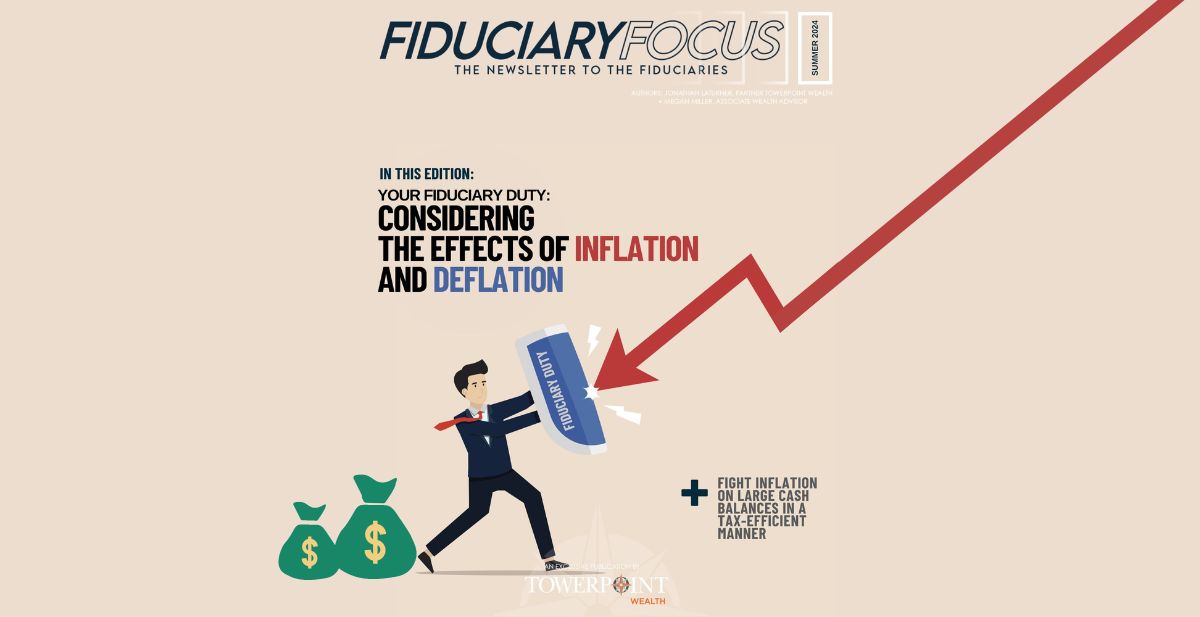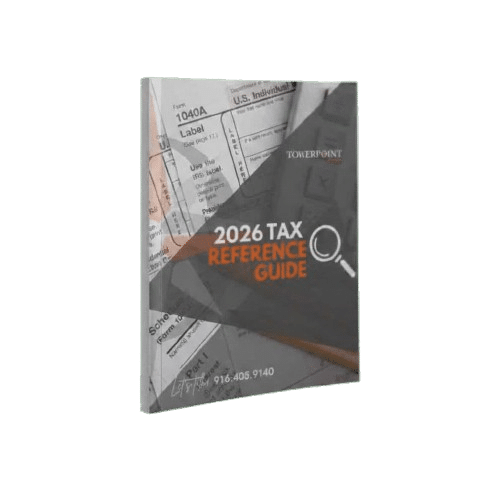
Welcome to the second edition of Towerpoint Wealth’s Fiduciary Group’s Newsletter – Fiduciary Focus!
As we are also held to a fiduciary standard, we understand the weight of our responsibility to safeguard your clients' assets. We are here to provide you with the insights, strategies, and tools you need to excel in this vital role.
Our Fiduciary Group combines 27 years of experience in guiding professional private fiduciaries, third-party trustees, conservators, administrators, and family members through their fiduciary responsibilities.
We are dedicated to providing the tools and resources to help you navigate the complexities of Trust Administration, Special Needs Planning, Conservatorships, and Estate Administrations with proper expertise and care.
As an independent Registered Investment Advisory firm, we are here to help guide you through your duties conforming with the binding guidelines of the Uniform Prudent Investor Act and California State Probate Code – bound by the same fiduciary standard as the fiduciaries we work with.
Your Fiduciary Duty: Considering the Effects of Inflation and Deflation
As vigilant fiduciaries, your duty to act in the best interests of your clients is governed by the principles outlined in the Uniform Prudent Investor Act (UPIA) and the California State Probate Code. Today, we’re going to be zooming in on California Probate Code 16047(c)(2).
California Probate Code 16047(c)(2) directs fiduciaries to consider the impact of inflation and deflation when investing and managing trust assets. Understanding – and mitigating – these potent economic forces is essential to both preserving and enhancing the value of our clients’ assets.
While we all have the responsibility for ourselves or our clients to consider these factors when making investment decisions, professional fiduciaries have the legal obligation to be prudent in their decisions to exercise reasonable care, skill, and caution.
By understanding the effects of inflation, fiduciaries can help safeguard their clients’ assets from inflation and mitigate the impact of eroding purchasing power and diminishing real value returns.

It’s also important to consider inflation as it relates to income needs and long-term planning when making decisions in a fiduciary capacity for clients. Beneficiaries often rely on income from the trust or estate to cover their living expenses. If inflation rises, the cost of living increases – therefore, a higher income is needed to maintain the same standard of living under these increased prices.
Inflation also affects long-term planning as, when the cost of living increases, fiduciaries must ensure that income streams grow enough to maintain purchasing power over time. This may involve incorporating investments that are expected to outpace inflation or using investment options that include inflation protection.
Conversely, deflation can increase the real value of investments but decrease the asset and investment values, slowing asset growth. As far as debt is concerned, deflation increases the real value of debt, making it more expensive to repay in terms of purchasing power.
As fiduciaries, we must remain vigilant and proactive in adjusting investment strategies to safeguard against these shifts.
1. Avoid allocating excessive cash balances in the bank or low-interest-bearing accounts for an extended period of time. Fiduciary clients with large cash holdings risk losing real value on their assets, which could otherwise be invested in options that provide growth and a better hedge against inflation. To fulfill their fiduciary duty, advisors must balance liquidity needs with growth objectives.
2. Diversify trust assets. Diversification is a fundamental strategy for managing the risks associated with both inflation and deflation. By spreading investments across a variety of asset classes, fiduciaries can balance the portfolio's exposure to different economic conditions.

3. Regularly Review and Adjust the Investment Strategy. As economic conditions change over time, like in an inflationary or deflationary period, it’s imperative to actively monitor and adjust investment allocations. This includes conducting periodic reviews to ensure the portfolio aligns with client objectives, rebalancing the portfolio as necessary, and remaining informed on economic factors and policies that may impact the portfolio’s performance.
Working with a financial advisor held to a fiduciary standard, like our advisors at Towerpoint Wealth, can help you as a professional fiduciary manage your fiduciary responsibilities.
Partnering with a financial advisor acting in a fiduciary capacity can help you offload some of the liability of managing your clients’ financial assets.
Adhering to the California State Probate Code 16047(c)(2) requires a diligent, informed approach to managing inflation and deflation risks. By doing so, we uphold our fiduciary duty by protecting our clients’ interests and optimizing their investment returns in changing economic environments.
2023-2024 Tax Season Tip
Fight Inflation on Large Cash Balances in a Tax-Efficient Manner
When working with clients in a fiduciary capacity to mitigate the effects of inflation on their portfolios, it’s vital to also consider the tax implications of investment decisions.
Investing large cash balances in tax-efficient alternatives such as Treasury Bills (T-Bills), Municipal Bonds, TIPS, and Floating Rate Instruments can help you balance the preservation of capital with tax efficiency.
1. Treasury Bills (T-Bills): T-Bills are a tax-efficient option for large cash balances as they are exempt from state and local taxes, providing a safe place to park cash with competitive returns while preserving capital.
2. Municipal Bonds (Muni Bonds): Muni Bonds offer tax-free interest at the federal (and sometimes state and local) levels, making them an attractive choice for high-income clients looking to shield income from taxes while still benefiting from inflation protection
3. Treasury Inflation-Protected Securities (TIPS): TIPS adjust their principal with inflation, preserving purchasing power. This makes them a direct hedge against inflation. Although their interest is taxable at the federal level, it is exempt from state and local taxes, enhancing their overall tax efficiency.

4. Floating Rate Instruments: Floating Rate Securities provide interest that adjusts with market rates, helping to combat inflation. They offer tax efficiency by generating interest income that can be more predictable in changing economic conditions, minimizing tax impacts compared to fixed-rate securities.
Focus on This

Announcement
We are thrilled to announce our relocation to a new, larger office within our current building! We’ve moved up 10 floors and are now located on the 20th floor of the BMO Building (formerly Bank of The West) at 500 Capitol Mall, Suite 2060.

This move is a result of our sustained growth and ongoing commitment to providing exceptional wealth management services, planning, and counsel to each of our clients.
We invite you to visit us soon and keep an eye out for an upcoming open house invitation later this fall!
If you need help reviewing your clients’ portfolios for tax savings opportunities or you need assistance in implementing any of these strategies - we are here to help. Reach out to Jonathan LaTurner or Megan Miller at the Towerpoint Wealth Fiduciary Group.
Connect with Towerpoint Wealth, your Sacramento Financial Advisor, on any of these platforms, and send us a message to share your preferred charity. We will happily donate $10 to it!
Click HERE to follow TPW on LinkedIn
Click HERE to follow TPW on YouTube
Click HERE to follow TPW on Facebook
Click HERE to follow TPW on Instagram
Click HERE to follow TPW on X
Click HERE to follow TPW Podcast : A Wealth of Knowledge







